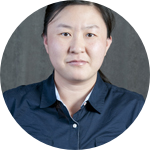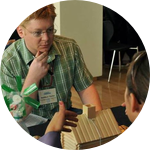About This Project
Many people find that programs like Solidworks and AutoCAD are difficult to learn. Computer-aided design software, also referred to as CAD, can be very frustrating so we are building tutorial software to help freshmen engineering students at Washington State University use CAD. To make our CAD tutorial useful we need to test this with at least 30 users. We need funding to compensate the test users and understand how to make this tutorial effective for students and everyday CAD users.
Ask the Scientists
Join The DiscussionWhat is the context of this research?
In 2009 Jon Peddie Research reported that there were around 4.22 million CAD users. In the 2015 fall semester, more than 120 freshmen students in mechanical engineering enrolled in CAD sketching class. Like using other complex software, learning CAD is frustrating.
We built a tutorial for an open sourced CAD software, FreeCAD, to help beginners easily to learn CAD software. The tutorial teaches people to use Boolean Operations, basic CAD operations, to construct complex objects from simple ones. User feedback is important for us to test effectiveness of the tutorial.
What is the significance of this project?
We will recruit at least 30 people to test the tutorial we built. These participants can be active CAD users or people who have no exposure to CAD software.
For a user that has little to no experience, he or she will learn some CAD basic skills during the test.
The tutorial will be open sourced.
What are the goals of the project?
The goal is to test the effectiveness of our FreeCAD tutorial.
During the test we will be collecting the participant's age, major, and the participants' sketching histories during the process. When participants finish the tutorial test, he or she will use a questionnaire to give their feedback. This questionnaire also examine whether or not they learned the Boolean operations through the tutorial process. We will measure participants performance by how long it took to complete the task and the completeness of the task. The tutorial consists of 4 regular tasks, one in the pre-test, three in the post-test. We will also have an extra task, which is not required, that participants can choose to finish.
Budget
We need the funding to compensate the people who test the tutorial. Each participant will be compensated $15 for half hour of their time. We will be surveying at least 30 participants. If we raise more money we will be able to increase our sample size.
Endorsed by
Meet the Team
Team Bio
Welcome to the Intelligent Robot Learning (IRL) lab http://irll.eecs.wsu.edu/ !
Dr. Matthew E. Taylor received his doctorate from the Department of Computer Sciences in the summer of 2008 from the University of Texas at Austin. Since then, he has worked for 2 years as a postdoctoral research associate at the University of Southern California and 2.5 years as an assistant professor at Lafayette College. He is currently an assistant professor at Washington State University in the School of Electrical Engineering and enjoys supervising high school, undergraduate, and graduate research projects. He is a recipient of the National Science Foundation CAREER award and has over 100 peer-reviewed papers.
Yang Hu is a PhD student, working with the Intelligent Robot Learning Laboratory (IRL lab), under the guidance of professor Matthew E. Taylor. She earned her Master degree in Mechanical Engineering from Washington State University in 2013 on the topic of disassembly time estimation on product design stage. She is currently working at the intersection of mechanical engineering, computer science, and engineering education.
Project Backers
- 3Backers
- 6%Funded
- $54Total Donations
- $18.00Average Donation



